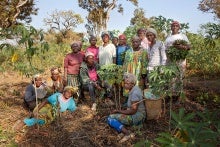The International Day of Rural Women recognizes the critical roles and contributions of rural women, including Indigenous women, in enhancing agricultural and rural development, improving food security and nutrition, and eradicating rural poverty. These are vital for protecting and securing our common future. The 2024 International Day of Rural Women invites all stakeholders to celebrate rural women’s essential role in building climate resilience, conserving biodiversity, and caring for the land.
There is much to protect against and to restore. Climate change, biodiversity loss, and land degradation have had significant impacts on the rights, resilience, and resources of rural women and girls. UN Women’s latest research estimates that globally, under a worst-case scenario, climate change may push up to 158 million more women and girls into poverty and 236 million more women and girls into food insecurity by 2050. Ecosystems, natural resources, and livelihoods are being depleted, and rural women’s ability to safely secure resources, such as healthy food, clean energy, and water, has diminished. Clean cooking fuels and technologies remained out of reach for nearly half of the world’s rural population (45.6 per cent) in 2022 and 1.8 billion people worldwide still rely on supplies off-premises for their drinking water. It is primarily women and girls who remain responsible for collecting biomass like wood for heating and cooking, and for collecting water in seven out of ten households.
It is time to promote rural women’s livelihoods, leadership, rights, and resilience as set out in the Beijing Declaration and Platform for Action ahead of its 30th anniversary next year. In doing this, we need to scale up investments, especially in rural areas, including in access to electricity and piped water systems. These are critical to alleviate women’s and girls’ unpaid care and domestic workloads and to support their daily work of building communities and restoring ecosystems.
It is equally urgent that we eliminate the discriminatory laws and practices that impede rural women’s rights to land and natural resources as has been called for in the Convention on the Elimination of all forms of Discrimination against Women. Despite the fact that rural women nurture life on the planet, their control over the land they cultivate is restricted or denied, while they earn just 82 cents for every dollar earned by men in agricultural production. These inequalities are compounded by women’s limited access to infrastructure, services, and social protection, which restricts their ability to bounce back from environmental shocks.
Let us replicate high-level commitments such as the Inter-American Decade for the Rights of All Women, Adolescents and Girls in Rural Settings of the Americas and the African rural women’s mobilization of the Kilimanjaro Initiative across all regions of the world to ensure that no rural woman is left behind.
And as we speed towards the three Rio Convention Conferences of the Parties this year, let us unite in promoting rural women’s rights, amplifying rural women’s voices, and taking concrete action to support their indispensable role in forging a more equitable, just, and sustainable world for all people and the planet.

